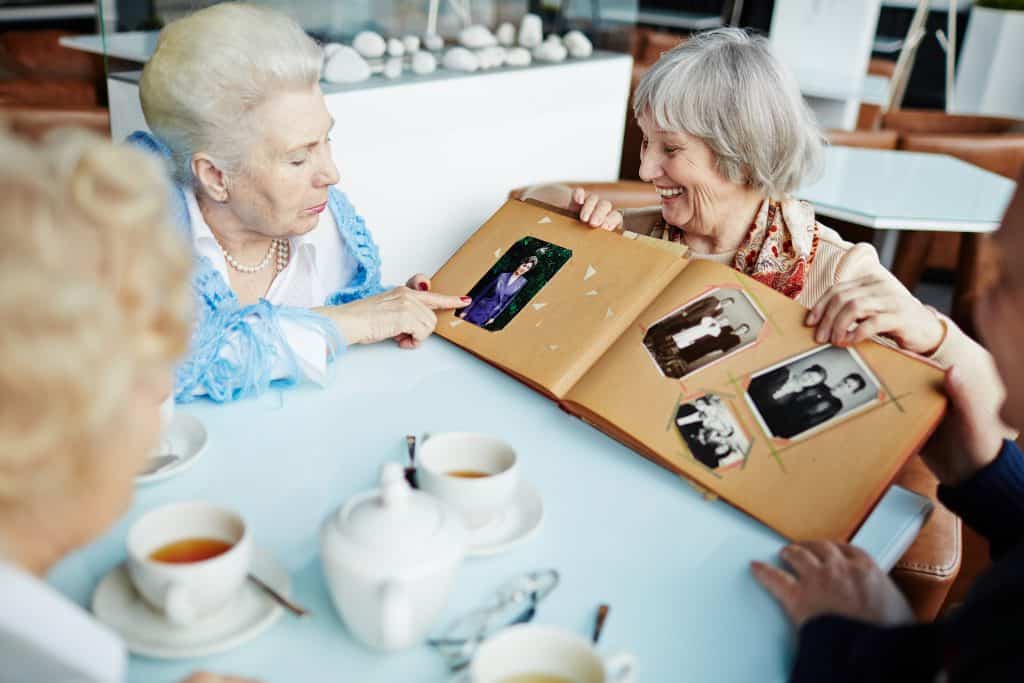6 stimulating care home activities for residents living with dementia
- Categories: Care Activities
Joe Webber
Share this article
Download this blog!
Don’t forget to grab your free PDF copy of this blog…
Encouraging residents to complete everyday tasks around the home is a great way to utilise strengths, conserve skills and create a sense of independence. Simpler tasks might include choosing clothes for the day, dressing oneself and maintaining personal hygiene, whereas others may require more challenging activities like cleaning or preparing meals. For residents living with dementia, finding suitable tasks can be tricky as there’s a lot to consider in terms of ability and risk. However, it’s critical for the resident’s wellbeing that they stay active.
Some people find it difficult, both mentally and physically, to follow certain routines or complete tasks – especially residents living with dementia. It’s important to take into account each person’s unique capabilities and whether or not a task will be beneficial for them. Pushing a person too hard, or to do something outside of their comfort zone, can be overwhelming and have negative consequences. This means careful planning must be done before deciding on any activity.

Mental health care plans
Before setting somebody a task or organising an activity, it’s essential to carry out a care assessment which can be used to produce a person-centred care plan. The care plan should highlight strengths, limitations, risks and goals. Multiple outcomes can be drawn from the assessment and by communicating with the resident, their family, friends or decision-maker. These goals might revolve around being active, maintaining skills, building confidence, encouraging independence, improving quality of life or enjoying a social life.
In order to support dementia patients with reaching personal and healthcare goals, activities should be stimulating, fulfilling and offer an outlet for self-expression. Those which are interactive and engaging, while providing a calming mindset, will see best results. It’s usually best to keep things simple, both in terms of choice and participants. Giving too many options can be overwhelming, and involving large groups can cause confusion if there’s a lot of noise and distraction. If possible, invite people who know the individual to help keep them engaged or create a group that will meet each other regularly.
To give you an idea of what activities are stimulating and can support residents living with dementia towards their goals, here are six activities which are engaging, interactive and relaxing.
1. Puzzles & games
Sometimes a good old-fashioned card or board game is all you need. Aside from providing entertainment, they can help you focus while encouraging critical thinking and problem solving. Winning a game is a great confidence booster and a fun social activity that can be done in any location of their choosing.
Offer games you know they are familiar with instead of trying to learn something new (unless requested). If the individual wishes to play alone or has a limited capacity, they may prefer to solve a jigsaw puzzle. Puzzles offer a therapeutic and cognitive exercise which support brain and memory function. If typical adult puzzles are too difficult and children’s puzzles aren’t engaging enough, there are specialist products available with larger pieces specifically designed for people who have trouble holding, seeing and using game pieces.
2. Experiment with apps
If a resident doesn’t have much experience with technology, tablets and smartphones shouldn’t automatically be discounted. There are plenty of apps designed to test and train our brains and many go through extensive development to ensure they are simple to use and accessible to different audiences. Many of your residents’ favourite puzzles, such as crosswords, word searches and sudoku can be played on a screen and usually they are easier to read than what you would find in the daily newspaper.
For anyone who has difficulty holding pens and may struggle to complete puzzles on paper, they will find benefit from being able to interact with the touchscreen. With countless apps available, your residents can enjoy the game or puzzle of their choice, whether it’s a word, number or visual puzzle. There are also apps created especially for people with dementia which aim to stimulate and challenge while maintaining the enjoyment aspect. Learning about technology can be an engaging and rewarding experience.
3. Regular exercise
It’s important that dementia patients also get regular exercise. Not only does it provide physical benefits, but it stimulates our minds in numerous ways. Some of the effects are experienced indirectly through improved mood and sleep that follow exercise – which in themselves reduce stress and anxiety. However, increased blood flow to the brain also directly supports memory function and brain growth.
Exercises can be done standing or sitting based on the individual’s abilities. If the individual is able, they could even go swimming or participate in water aerobics classes. Before planning an activity, you should take into account how much mental focus is required to complete an exercise. For example, sometimes you need to count along while performing an exercise, follow instructions in real time, or mirror the movements of the person leading the activity. This means certain tasks can quickly become difficult if the routine is too fast or complicated.
4. Create a memory box or memory book
Assembling a memory box is an interesting and fun activity used to engage residents. Organising personal belongings usually evokes memories and triggers emotions in a calming way, making it the perfect project for people who like to keep hold of meaningful or quirky belongings acquired over the years. Help them sort through their favourite objects and mementos and ask them what they remember about each item. Try to incorporate different senses during the process, such as listening to old records, touching fabrics or smelling perfumes to get the most stimulation.
Memory books are another great option, allowing the resident to rediscover and examine sentimental items, then store them in a more organised fashion. These can be anything from photos, ticket stubs, birthday cards or letters. Looking at historic documents will promote conversation, and the details that emerge can be used to write notes alongside the items in the book. If you can find out when and where an item was acquired, you can begin to tell a story. Noting down as much knowledge as you can about their past will be extremely useful to look back on and talk about as their memory loss progresses.
Once the resident is finished, they can then look through their memories whenever they feel like reminiscing. Or if they really enjoyed the activity, why not organise them all over again? These are great tasks to save for a rainy day, or when the resident feels particular tired or down. It’s also a great opportunity for the care worker to learn more about the history of the resident. You never know what you’re going to find out and it’s an invaluable tool which can accompany the individual should they have to move to another facility.

5. Turn to nature
Never underestimate the power of a little sunshine, fresh air and the sound of wildlife. You don’t need any special skills to go on walks or trips to scenic locations. The sun is a natural source of vitamin D and may improve moods and mental health. For many people, sitting on a park bench and taking in nature is much more rejuvenating experience than being indoors and watching TV. Depending on the resident’s mood, it’s ideal for both one-on-one adventures or group activities and a great source of exercise.
Alternatively, if you have a community garden, you don’t even need to travel off the grounds to offer a rewarding outdoor activity. Gardening is another form of exercise which can be very stimulating and engaging. Feeling the textures of different flowers, plants and soil, observing vivid colours and smelling certain scents can be extremely relaxing.
The wider variety of flowers, the better. And best of all, watching your hard work come to life and flourish gives you something to look forward to. Smaller tasks like weeding, tidying, trimming and sweeping can be suitable for people living with dementia and fulfilling knowing you’ve helped the community.
6. Complementary therapies
Complementary therapies are becoming popular in care homes. Many of which have shown to have benefits for people living with dementia. Although they can be costly, a trained professional will understand the needs of the individuals in your care and help formulate a programme to benefit them in reaching a goal. They also provide all the equipment, so you don’t need to organise too much if you lack time or resources.
Pet therapy allows the person to meet a variety of trained animals to hold and touch. The sensations of different touches and smells have been known to bring back memories. However, even without memories they are a great conversation piece, but overall it’s a relaxing and comforting experience. Holding animals, especially more exotic types, can help build confidence and is a perfect photo opportunity.
Music therapy allows people to play instruments and listen to their favourite songs, potentially evoking memories and generating feelings of nostalgia. It’s an empowering form of expression used to communicate what you’re feeling, by finding the sound that’s right for you and being part of a unit. It’s perfect for people that struggle to speak or say what’s on their mind.
Through aromatherapy, certain scents like lavender have been proven to help relax dementia patients and help them sleep. The essential oils can also be used in baths and as part of massage. Massage therapy without the oils can help relax. There are some risks involved with complementary therapy and you should consult with a qualified therapist that specialises in the area to make sure they are right for you.
Safety first
Protecting the resident at all times and ensuring they remain calm is a priority. There must always be someone present to help guide the resident through an activity and monitor their behaviour. It’s also important to encourage independence, so patience is key. If the individual is struggling with an activity it doesn’t necessarily mean they need to stop. It might just take them a bit longer to work towards their goal. However, if the individual becomes confused or frustrated, the care worker can direct their focus to something more relaxing and reassess their needs for next time.
All potential risks must be considered during the care plan creation process and this information should be the used as a defining factor when choosing suitable activities. Ultimately, the activities and goals you and your residents set will depend on the stage of the individual’s condition and their skills. Because dementia affects memory, abilities, energy levels, vision, hearing and flexibility, care plans must be adapted to accommodate developments as soon as you notice changes. This is part of the person-centred care service.

Using CareDocs
There are several tools within CareDocs that can assist you in caring for people with dementia. Quality care for any resident, regardless of a condition, starts with producing a care plan that’s person-centred and based on individual circumstances with input from all parties. The care plan should be easily accessible by everyone who has a responsibility for looking after the person as well as loved ones who wish to understand the care.
CareDocs enables care workers to easily create and maintain unique digital care plans following a thorough care assessment. Our care plans are made up of dozens of sections to cater for all aspects of daily care, including mental health. Once the care plan has been approved, you can use the document to help your residents remain independent, self-reliant, fulfilled and in control for as long as possible, while assessing risks and working towards goals.
Care assessments and care plans in CareDocs can be viewed by relevant personnel in as little as three clicks of the mouse on our desktop and mobile systems.
Our customisable system allows you to create custom care plans for all scenarios, including any therapies or activities which are crucial to the wellbeing of individuals in your care. The Daily Notes feature is your go-to point for recording individual and group activities, while the emotion mapping tool gives you the ability to log their mood in relation to the event. Taking note of emotions is extremely useful for looking back to see what’s preferred by the resident and what isn’t having the desired effect.
For more information about how CareDocs can support your requirements, call us on 0330 056 3333, email us at sales@caredocs.co.uk or book a free demo.
Download a Mental Health Sample Care Plan here
Download this blog!
Don’t forget to grab your free PDF copy of this blog…
Share this article
Author
Joe Webber
Search
Recent articles
- CareDocs Partners with the Professional Record Standards Body (PRSB) to Support Care Standards Fit for the Future of Digital Care January 30, 2024
- CareDocs Joins the Care Software Providers Association (CASPA), an Independent, Not for Profit Association, Representing Software in the Care Industry January 19, 2024
- CareDocs partners with Bristol Waste to tackle digital poverty January 10, 2024
Recent comments
- 1.2. Assess use of care plans in applying person-centered values - CIPD Writers on What is person centred care planning and why is it important?
- Call tracking tips for care home marketers - Chester Times on The importance of effective communication in care
- Why is effective communication important for positive relationships with individuals in care? - Building-Craft on The importance of effective communication in care










